Exclusive records show Nevada athletics ran afoul of Title IX. Its leaders shrugged.
Many hours they should have spent practicing, Aaliyah Rivas and her teammates roamed the University of Nevada, Reno softball field carrying shovels and buckets instead of bats and balls.
The athletic department rarely maintained the field. So plowing snow, pulling weeds and picking rocks, trash and goose poop out of the grass fell to coaches and players.
The team had complained for years about its dilapidated facilities. The dugout toilets didn’t flush. The field lacked lights, which meant games could be played only in the daytime, when many fans were in class or working.
Its locker room – a 10-foot-wide converted metal shipping container – lacked running water and the doors didn’t lock. Many players changed into their uniforms in their cars.
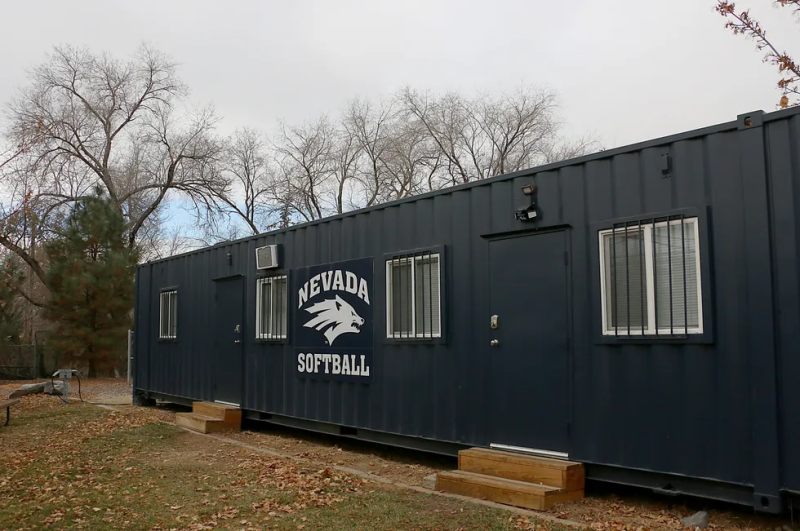
The Nevada baseball team suffered none of those problems. Its field was well-maintained with artificial turf and stadium lights. Its spacious clubhouse featured bathrooms and showers, coach and player lounges, indoor batting cages and pitching mounds, a medical training room and a fitness area.
It was all a sad wake-up call for Rivas, whose lifelong goal had been to play NCAA Division I sports.
“You’d expect that at a D-I university, it would be different,” she said. “But women’s sports still got the bare minimum.”
The college was among many whose athletic departments had made progress toward treating male and female players more equitably in the decades after the enactment of Title IX, the landmark 1972 federal law that banned sex discrimination in schools.
But that progress all but stopped in 2013 under a new athletic director, Doug Knuth. Although he is not broadly known in the world of college athletics, Knuth’s impact was crushing for female athletes at Nevada, and he has since amassed significant power over the future of women’s sports on a national scale.
Knuth, who left the university in 2022, declined to be interviewed or answer questions for this story. In an emailed statement, he defended his track record, suggesting he was dealt a bad hand from the start.
“I am and always have been an advocate for women’s athletics throughout my career as a leader in college athletics,” Knuth said in his statement. “During my tenure at Nevada, I led several initiatives to help solve decades-long issues of inequality that predated my time at the university.”
USA TODAY interviewed more than two dozen current and former Nevada athletes and employees and reviewed thousands of pages of emails, equity reviews, facility plans, financial reports, fundraising records and other documents obtained via public records requests.
Multiple internal assessments since 2018 pinpoint disparities that put not just softball, but virtually every Nevada women’s team at a disadvantage in a wide range of areas, including facilities, recruiting, meals, travel, equipment, publicity and access to medical treatment.
USA TODAY Investigation: Funding of college sports falls short of law’s promise to women
The U.S. Department of Education Office for Civil Rights launched an investigation into Nevada athletics in 2019 for allegedly violating Title IX. Even with outside eyes on them, the school’s top officials, including the president, did little to address the problems.
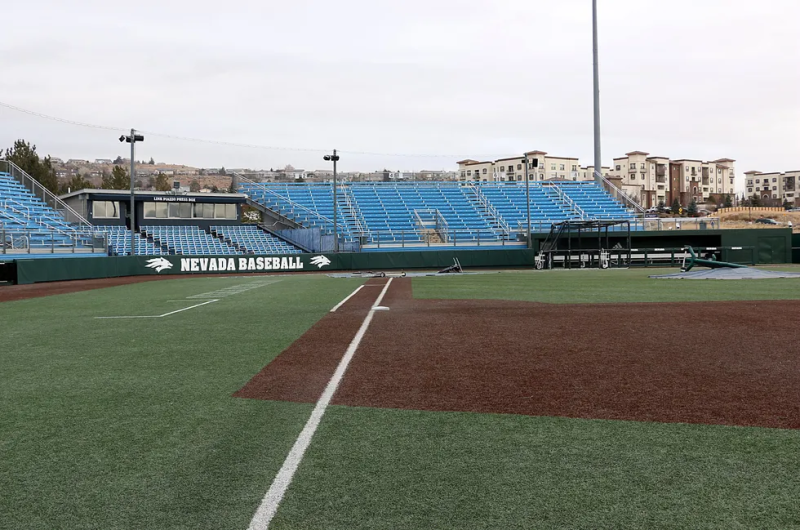
When university leaders send a message that women don’t matter, women come to accept and expect unfair treatment, which is how cultures of sexism and discrimination perpetuate, said Elizabeth Taylor, a Temple University professor who studies diversity and inclusion in the sport industry.
“It forces women to wonder why they would continue to report or try to fight in a system where they’re not supported,” Taylor said. “So they just continue to operate in these spaces where they are mistreated.”
Recently, under a new president and athletic director, Nevada has started closing the athletic gaps. But former school leaders allowed the problems to fester for so long – while funneling money toward luxuries for men’s teams – that full solutions are now tens of millions of dollars out of reach.
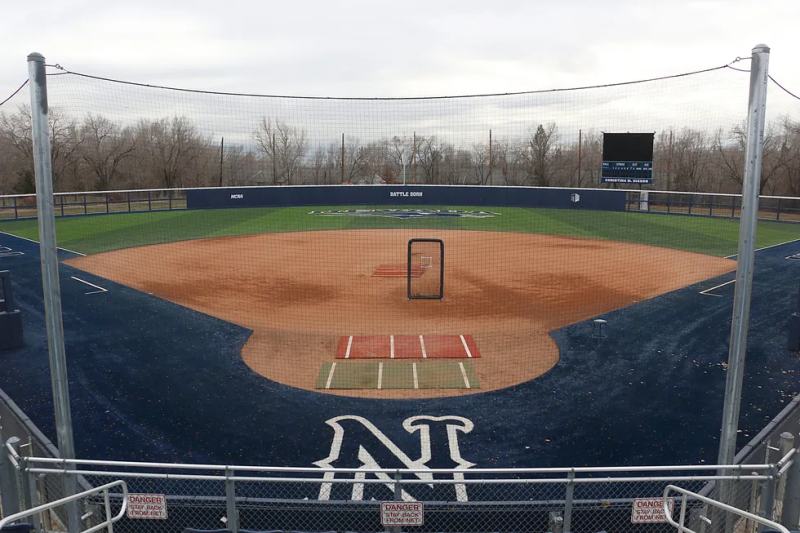
Workplace complaints dog new athletic director
About 50 people gathered in the auditorium of Legacy Hall on the UNR campus to hear from the three finalists for the athletic director job.
The winner would follow in some large footprints. Cary Groth, the school’s athletic director since 2004 and one of the first women to run an NCAA Division I program, was retiring after three decades in the industry.
Knuth, a former tennis captain at the University of Connecticut, brought 18 years of experience at five college athletic departments, most recently the University of Utah.
He was the youngest candidate for the job at 40 and the only one with no experience running a Division I athletic department. But he sold himself on his fundraising prowess, intimate knowledge of the Mountain West Conference and “laser-like focus” on athlete well-being.
“My job is not a fundraiser,” Knuth said at the March 2013 public forum. “It’s all about how we transform lives.”
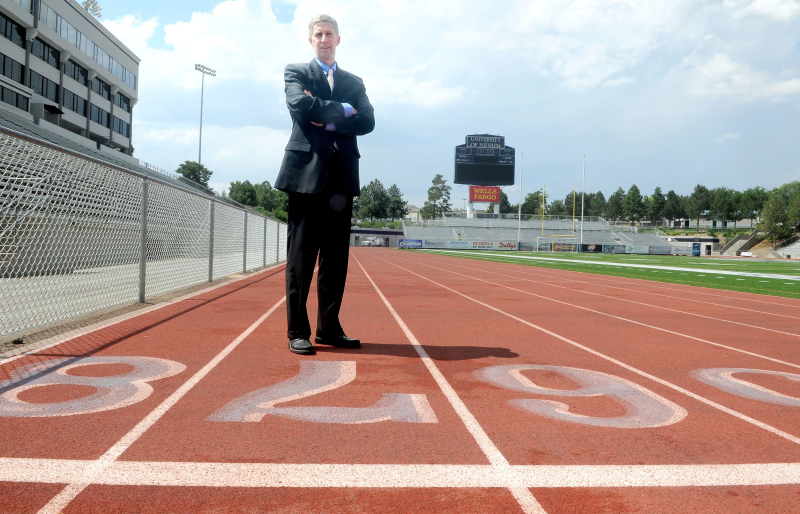
Knuth got the job. He wasted little time wooing wealthy Wolf Pack boosters. Within five years, Nevada cut the ribbon on a $14 million football stadium upgrade, new football locker room and player lounge, state-of-the-art basketball practice gym and six outdoor tennis courts.
Erik Musselman, a former NBA coach Knuth hired in 2015, led the Nevada men’s basketball team to three-straight Mountain West Conference titles and the Sweet 16 round of the NCAA Tournament. A surge in ticket sales, sponsorships and licensing deals followed.
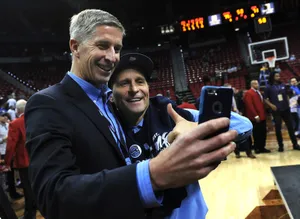
Revenue for the department reached $38 million by the 2018-19 school year, NCAA financial reports show – up $11 million since Knuth took over. University President Marc Johnson and the Board of Regents rewarded him, increasing his annual salary from $285,000 to $400,000.
“Doug has excelled in every expectation we’ve had for our department of intercollegiate athletics since his arrival,” Johnson said in a March 2016 press release.
Behind the scenes, however, complaints were stacking up about Knuth’s treatment of women in the workplace.
Several former employees complained that Knuth overwhelmingly hired men for major roles, paid men more than women who were equally or more qualified, and routinely excluded women from meetings, trips and other opportunities, according to interviews, emails and other documents.
The university hired a local law firm in 2018 to investigate allegations that Knuth created a hostile work environment for women, according to invoices and former employees. Among those interviewed by the firm was Carol Scott, who had been Nevada’s team physician since 1994.
Scott told USA TODAY that Knuth did not meet with her for weeks after he started, despite her requests. Later, she said she heard that he was uncomfortable with a woman in the football locker room. He ignored her medical advice, she said, and excluded her from eating with the team and riding on its bus.
Scott said she felt Knuth was trying to push her out.
Eventually, it worked: Scott quit in 2015 and moved full-time to the student health center. Knuth hired two men to replace her.
“If it wasn’t so sad and so unfair, it would be laughable,” Scott said. “He was just allowed to get away with it over and over and over.”
The school also twice investigated allegations of an inappropriate relationship between Knuth and an assistant cheerleading coach who worked for the department from 2011 to 2018, Johnson, then the university president, told USA TODAY.
By 2016, Knuth and the coach, Marci Banes – both then married to others – had become friendly, emails show. That May, Knuth invited her to stay with him during a two-day business trip to La Jolla, California, where he would be sleeping at a donor’s house.
“Direct flight to/from for only $298,” Knuth wrote her in an email from his UNR account. “I’ll split it with you.”
Knuth and Banes each divorced their spouses around late 2018, court and property records show. They married the following year.
According to Johnson, none of the investigations found Knuth violated any school rules.
Knuth, who is now athletic director at Southern Utah University, addressed the investigations in general terms in his emailed statement.
“All I can tell you is I fully participated and fully cooperated in every review or investigation,” Knuth wrote. “I answered every question, including about gender inequities and my wife. Through each and following each, I was never made aware of any wrongdoing and was cleared of all accusations.”
Banes, who now goes by Marci Knuth, did not respond to phone or email messages seeking comment.
The university denied USA TODAY’s public records request for the investigation reports, citing a policy adopted by the Nevada System of Higher Education’s Board of Regents that broadly deems all personnel files confidential.
Gender equity concerns reach fever pitch
As female employees spoke out about Knuth, frustrations over disparate treatment grew among Nevada’s female athletes.
Amid all the success for men’s sports, the women felt left behind.
Several women’s teams’ practice and competition facilities weren’t up to standard. That included the women’s indoor and outdoor track and field teams – Nevada does not sponsor men’s track and field – which account for more than 40% of the school’s roster spots for female athletes.
Nevada’s outdoor track, which wraps around the football field, runs beneath bleachers added decades earlier for extra seating at football games. The resulting tunnel means runners disappear from sight for a few hundred feet each lap, rendering the track unsuitable for meets; the team must travel for every competition.
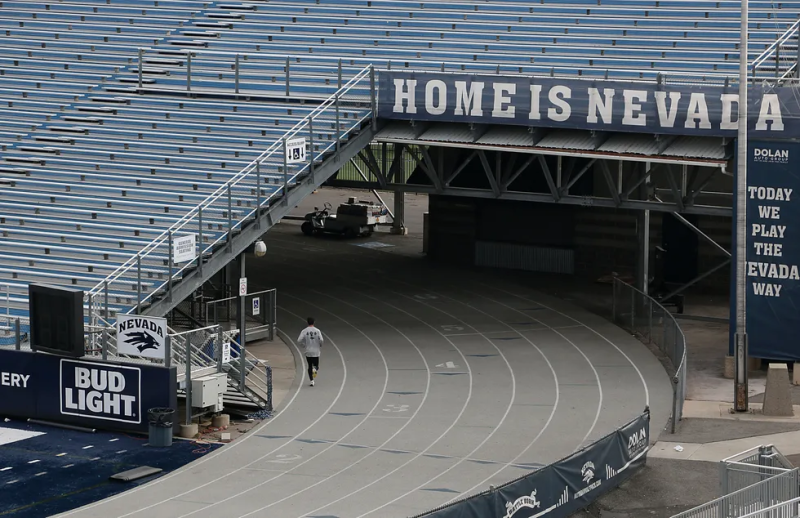
Women also run indoor track, a winter sport, even though the campus has no indoor track. They practiced outdoors, sometimes amid snow and ice, said Hiley Dobbs, who ran track and cross country for Nevada from 2016 to 2021.
Although the athletic department’s maintenance team regularly plowed snow for football, Dobbs said track athletes several times had to shovel snow themselves.
“I remember our coach saying, ‘We’re a blue-collar team, we work hard,’” she said. “And I remember thinking that’s not something football or basketball would have to do. They don’t have to mop the floor of the gym.”
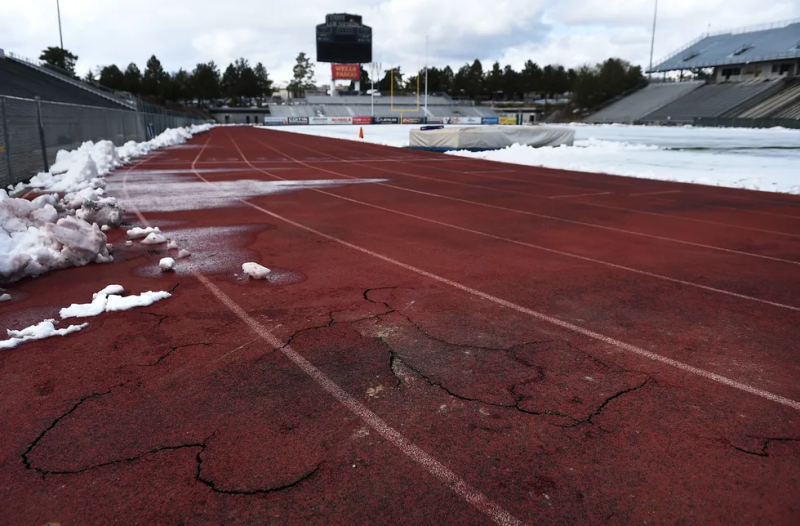
Locker rooms were another glaring problem. While 85% of male athletes had access to an exclusive locker room, only 17% of athletes on women’s teams did, a 2020 assessment by the school’s Title IX coordinator found.
The women’s swimming and diving team’s locker room was open to the public – used by patrons of the school’s public pool.
The soccer, track and field, and cross country teams shared one locker room, which doubled as the locker room for visiting football teams. Forced to vacate it on football game days to make room for the visiting team’s men, the women sometimes returned to find their equipment damaged or stolen, according to a 2018 Title IX compliance review.
Among the female athletes, women’s basketball players had it best. Their facilities were mostly on par with the men. But men’s basketball players got many more perks.
During Knuth’s tenure, the men’s team spent double what the women spent on travel – $4.8 million vs. $2.3 million, NCAA financial reports show. While Knuth had inherited a similar gap from his predecessor, under him, it widened. No other Mountain West Conference school spent more on its men’s team or had a bigger disparity.
Men’s basketball regularly flew to and from games on specially chartered flights, which have no other passengers, layovers or security lines. The women almost always flew commercial, taking long bus rides to get to the cheapest airports.
Hotel folios show the men’s basketball team regularly purchased custom banquet-style buffets for breakfast, lunch and dinner. Their breakfasts, which often featured a personal omelet chef, sometimes exceeded $100 per person. The women often bought groceries and ordered takeout.
Division I schools typically provide food to athletes, who burn thousands of calories a day. But food was scarce for Nevada female athletes.
In 2019, the men’s basketball team started dining out on the athletic department’s dime three or more times a week at Archie’s Giant Hamburgers and Breakfast, a popular restaurant near campus, transaction records obtained by USA TODAY show – even during the off-season. The school paid for the women’s basketball team to eat at restaurants only on game days and while traveling.
A daily spread of healthy meals and snacks in the weight room was reserved only for the men.
The topic of equal treatment came up several times in discussions with coaches and administrators, said Sami Dinan, a Nevada women’s basketball player from 2016 to 2020. Each time, they responded that the men got more opportunities because they were nationally ranked, and the women’s team was not.
“I don’t agree with it,” Dinan told USA TODAY. “If there was more investment, maybe we would have done better.”
Julia Jensen, a Nevada softball player from 2018 to 2021, was among those who voiced concerns about the unequal conditions facing female athletes. As president of the Wolf Pack’s Student-Athlete Advisory Committee, she met with Knuth regularly.
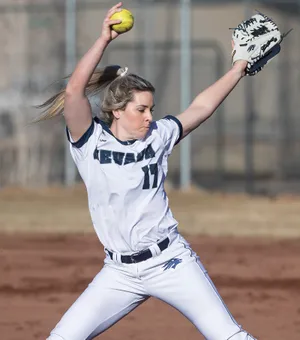
Jensen and other athletes raised the issue at meetings, minutes show, and in year-end surveys. They even discussed the inequities in a Zoom meeting with the state’s senior U.S. senator, Catherine Cortez Masto.
“The administration knew our concerns and they had known them for a long time,” Jensen told USA TODAY. “We didn’t feel like it was asking too much.”
Federal government intervenes, then disappears
The letter landed with UNR President Marc Johnson on a Wednesday in 2019, the day before Halloween.
It came from the U.S. Department of Education Office for Civil Rights, the federal agency that enforces Title IX: The office had received a complaint against the Nevada athletic department.
“The complainant alleged that the university discriminates, based on sex, against female student athletes,” it said, by failing to provide men’s and women’s teams comparable facilities and recruiting resources. “OCR will proceed with the investigation of these allegations because the allegations raise a possible violation of Title IX.”
It should have come as no surprise.
A year earlier, an outside law firm hired by the school to assess the athletic department’s Title IX compliance found several “areas of concern,” including with practice and competition facilities, locker rooms and nutrition.
The university had done little to address the issues, however. It commissioned some designs for facility upgrades and installed the shipping container at the softball field as a makeshift locker room.
Faced with the potential of a full-blown federal investigation, the university opted to go another route.
Before submitting any of the documents the Office for Civil Rights investigator requested, the university asked to voluntarily resolve the case – the administrative equivalent of a settlement. The federal agency agreed.
The agreement, signed in December 2019, required UNR to first conduct an internal assessment. The university’s then-Title IX coordinator, Maria Doucettperry, submitted a 26-page report in April 2020 that acknowledged significant gender gaps in facilities and recruiting.
If the agency approved the assessment, the next step would have been for the university to develop and execute an action plan, with progress reports every six months.
Education Department spokesperson Vanessa Harmoush declined to discuss what happened next with USA TODAY, saying the agency does not talk about cases that are under monitoring.
But according to UNR spokesperson Scott Walquist, the university never heard back from the Office for Civil Rights, so it never developed or submitted its plan.
“Although OCR never accepted or responded to the review, the University has addressed a number of items within the report,” Walquist said. Among the upgrades around that time, the school added electricity and a new scoreboard to the softball field.
After USA TODAY contacted the Education Department for comment, the Office for Civil Rights on April 17 sent UNR its first correspondence in four years, saying it was “currently preparing a response” to the school’s 2020 assessment.
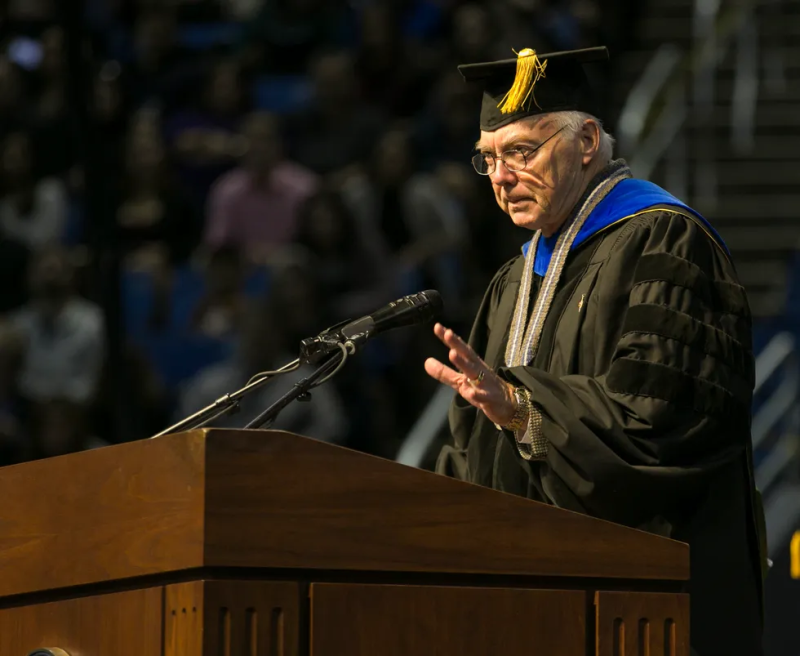
Complaints about women’s teams’ facilities were near constant during Johnson’s presidency from 2011 to 2020, he told USA TODAY. He said he was unwilling to spend taxpayer and tuition dollars on improvements unless they benefited all students, not just athletes.
Johnson justified men’s basketball and football facility expansions during his tenure by noting they were largely donor-funded and necessary to increase revenue for the whole department, but he acknowledged that the lopsided approach could violate Title IX.
“If we were called on it or investigated and were given sanctions of some kind, we would have to respond,” Johnson said. “We had complaints, not sanctions.”
“If I responded to every complaint I ever had,” he added, “I would just be responding to complaints all the time.”
Title IX campaign struggles amid fourth investigation
In early October 2020, a new president took over at the University of Nevada, Reno.
Brian Sandoval, the state’s former two-term Republican governor, was briefed in his first weeks on campus about the athletic department’s gender inequity problems, he told USA TODAY.
“Without exception,” he said, “every women’s sport needed help.”
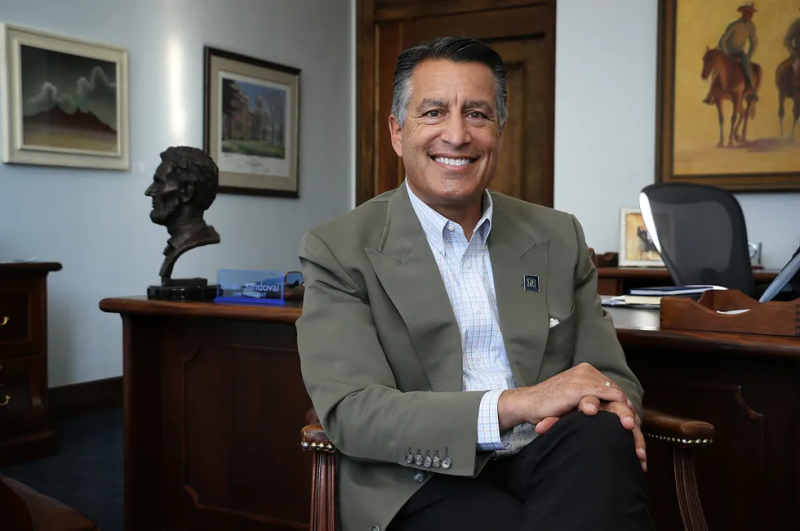
Sandoval quickly addressed some of the lower-hanging fruit, launching a fund to provide meals to female athletes, commissioning new facility designs and raising the salaries of coaches of women’s teams – all below the conference median.
There was little money, however, to address the department’s biggest facility deficiencies. The school faced a 12% pandemic-related budget cut from the Legislature. The athletic department was $9 million in debt and operating in the red, financial reports show.
Knuth started planning a fundraising campaign at Sandoval’s request in April 2021, emails show. Called Elevate, Knuth billed it as a celebration of Title IX’s upcoming 50th anniversary, according to draft campaign brochures.
Early on, Knuth emailed top administrators a wish list of 23 “Title IX” facility projects in order of which was likely to happen soonest. The eight highest-priority projects all directly benefited football and men’s and women’s basketball. Most would do little to address the gender disparities; some would actually widen them.
The No. 1 priority: Remodeling the football and soccer locker rooms.
The last priority? A new track for the women.
Two of the university’s vice presidents asked Knuth to re-rank the list in order of need. Knuth replied it was already in “priority order," adding that projects for virtually every sport – football, soccer, basketball, track, baseball, swimming, tennis and others – could be considered the highest priority.
“I’m not being flip,” Knuth wrote, “but every project is greatly needed.”
After a year courting donors, Elevate was scrapped. The campaign “and its supporting documentation/materials lacked the detail and specificity needed from Athletics to officially launch,” Sandoval told USA TODAY in an emailed statement.
It’s unclear how much money Knuth and his team of fundraisers raised during that time. In some internal documents, they claimed to have brought in more than $20 million. But that figure consisted mostly of pledges made prior to Elevate, and almost all of it was earmarked for projects primarily benefiting football, baseball, and men’s and women’s basketball and tennis.
According to donation data provided by the university, Knuth as of April 2022 had raised little money for the teams that needed it the most: $30,000 toward a locker room for the women’s swimming and diving team; $23,000 for softball stadium upgrades; and nothing for women’s track.
Meanwhile, Sandoval greenlit several of Knuth’s high-priority projects, including a new $12 million building for men’s and women’s basketball with swanky locker rooms and player lounges. Construction is underway.
As the Elevate campaign floundered, the university quietly conducted a fourth investigation into Knuth’s conduct toward women.
A female athletic department employee complained to the university’s Title IX office in March 2021 that Knuth made disparaging comments about pregnant women. She accused the school of turning a “blind eye” toward Knuth’s sex discrimination in a letter her attorneys wrote to Sandoval that May.
“While the above outlined issues have fallen on deaf ears in the past,” the letter said, “we remain hopeful that under your leadership these issues will finally be addressed.”
The school hired a Las Vegas law firm that June to investigate the woman’s claims, emails and invoices show.
One year later, the employee received a one-page letter from Doucettperry, the Title IX coordinator. No investigation report or rationale for the findings was attached – a standard practice at other universities. The university would not provide it to USA TODAY either, citing the same policy that deems personnel files confidential.
“A preponderance of the evidence does not support a conclusion that you or other University employees within the Athletics Department were subjected to unlawful discrimination, harassment or retaliation,” the May 2022 letter from Doucettperry said.
“The investigation is now closed.”
Knuth gets payout, new home and NCAA award
The sky was still dark when Nevada softball coaches and players arrived at their makeshift locker room early one morning in March 2022 to pick up their gear ahead of a crucial road series.
Inside the navy blue shipping container, they quickly discovered that thousands of dollars worth of bats, gloves, equipment bags and sunglasses had been stolen.
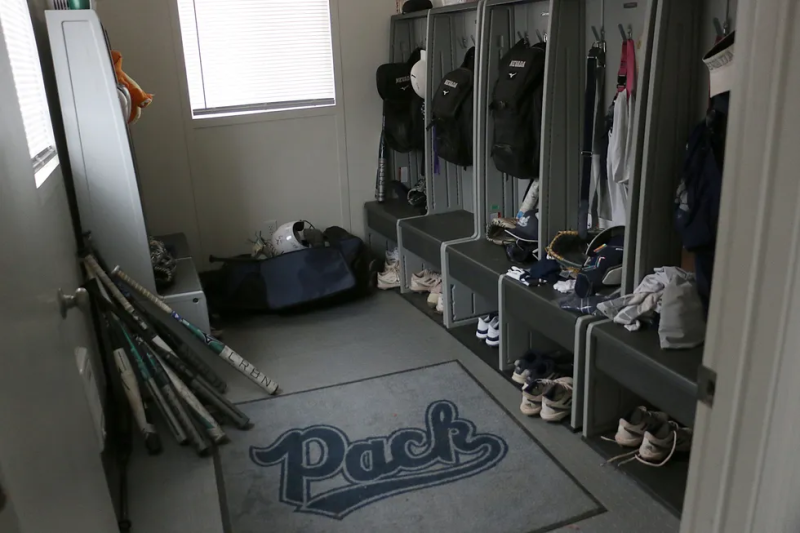
The thieves appeared to have stayed a while. The team’s snacks had been eaten. A pair of pants and cheap camouflage glasses had been left behind. Several bags had been piled into a mattress of sorts.
“There was a homeless person we thought was living in there,” said Rivas, then a sophomore on the team.
A campus police investigation found no signs of forced entry and that the door locks didn’t work, emails show – even when latched, the doors could be pushed open. Linda Garza, the school’s softball coach, expressed concern for her players’ safety in an email to Knuth and others.
The incident prompted Nevada athletes from several teams to speak publicly about the state of their facilities. Some posted on social media. The local news picked up the story.

Two athletes met with Knuth to discuss their concerns, emails show. Knuth later told Sandoval that it was “a really good conversation.”
Sandoval wasn’t having it.
“The feedback that I received from the meeting was that the athletes continue to be frustrated and were not at all satisfied with the meeting,” Sandoval emailed Knuth back on April 6. “I was also informed that you laid the blame for the deficiencies associated with athletics facilities with administration.”
When Knuth’s contract came up for renewal two weeks later, Sandoval did not renew it. The university ultimately paid him $308,000 to leave. In a press release, Sandoval thanked Knuth for “the many positive steps he made” for the athletic department.
Sandoval named Knuth’s replacement that June: Stephanie Rempe, previously a deputy athletic director at Louisiana State University. Rempe has helped push across the finish line new locker rooms for women’s swimming, track and field, cross country and other teams, an initial round of softball stadium upgrades and track repairs, thanks in large part to a $6.9 million subsidy from the academic budget.
The university used another $2.3 million Knuth raised to remodel the football locker room and carve out a separate locker room space for women’s soccer. The football players got a video wall, barber shop, new shower area and new lockers; their old lockers were refurbished and given to women’s teams.
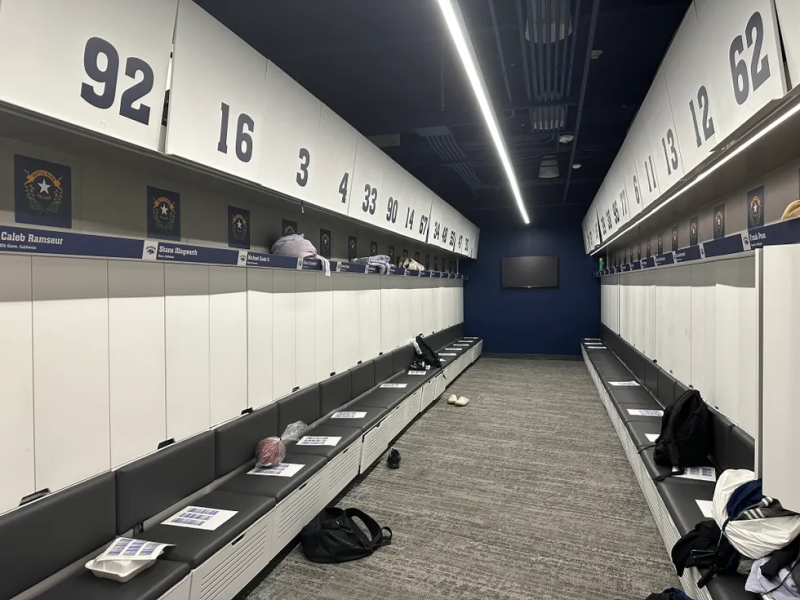
Today, most female athletes have a quality locker room. Softball players aren’t among them. While they continue to await a long-promised clubhouse, indoor practice facilities and lights – at an $11 million price tag, according to a 2022 estimate – they were given a second shipping container.
“The strides made over the past three and a half years in upgrading facilities for women’s athletics and bolstering the Office of Equal Opportunity and Title IX underscore our commitment to structural and organizational improvements, aligning with the evolving needs and expectations of our University community,” Sandoval said in a statement to USA TODAY.
Southern Utah University named Knuth its new athletic director in December 2022. He was appointed six months later to the NCAA Division I Council, one of 40 people with a seat at the mostly-male table that makes key decisions affecting all 190,000 Division I athletes across the country, half of whom are women. Knuth chairs the legislative committee, which makes recommendations on the merits of new rule proposals.
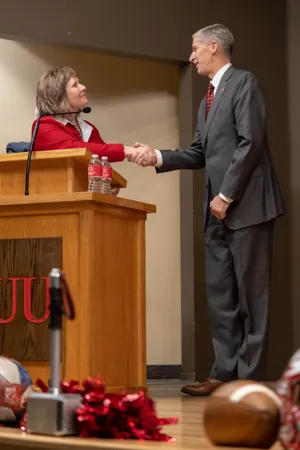
In March, Knuth was one of three men to receive an NCAA award for being a champion of diversity, equity and inclusion. A press release praised him for his “focus on providing opportunities for women and people of color” dating back to Nevada, and for hiring a woman as his deputy at Southern Utah.
The release didn’t mention that the woman, Marie Tuite, is perhaps best known for her role in a sexual abuse scandal at San Jose State University.
A 2021 investigation by the U.S. Department of Justice found that San Jose State officials had violated Title IX for more than a decade by failing to adequately respond to repeated complaints against Scott Shaw, its sports medicine director from 2008 to 2020 who last year was criminally convicted and imprisoned for sexually assaulting female athletes.
Tuite was the school’s athletic director from 2017 to 2021 and a senior department administrator for the seven years prior.
The Justice Department also substantiated complaints by two employees who said Tuite retaliated against them when they tried to hold Shaw accountable by issuing one a negative performance review and firing the other.
The school demoted Tuite, who ultimately resigned.
Tuite did not respond to a request for comment but her attorney, Susan Bishop, issued a statement: “At no time during my client's tenure at SJSU did any student-athlete come forward to Ms. Tuite with an allegation of inappropriate touching by Head Athletics Trainer Scott Shaw.”
Southern Utah did not answer questions from USA TODAY, saying in a statement that Tuite and Knuth were thoroughly vetted.
The school also denied USA TODAY’s public records request for documents reviewed by the committee that hired Knuth, including his application and background check. It provided only a copy of his resumé.
On his resumé, Knuth listed his top professional accomplishments at Nevada. The third item down:
“Launched campaign focused on gender equity.”
Kenny Jacoby is an investigative reporter for USA TODAY covering sexual misconduct and Title IX. Contact him by email at kjacoby@usatoday.com or follow him on X @kennyjacoby.
Disclaimer: The copyright of this article belongs to the original author. Reposting this article is solely for the purpose of information dissemination and does not constitute any investment advice. If there is any infringement, please contact us immediately. We will make corrections or deletions as necessary. Thank you.







